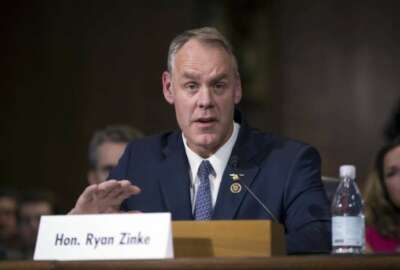
Potential workforce reductions at Energy, Interior leave some lawmakers ‘troubled’
Lawmakers are beginning to probe the depths of civilian agency budget cuts to discover the extent of their cost in human terms, and it’s leaving some of them...
Lawmakers are beginning to probe the depths of civilian agency budget cuts to discover the extent of their cost in human terms, and it’s leaving some of them concerned.
Interior Secretary Ryan Zinke and Energy Secretary Rick Perry attempted to alleviate some of those concerns during a series of hearings before the Senate and House Appropriations committees, as well as the Senate Energy and Natural Resources Committee.
“To speak to the energy and science accounts for a moment, initial estimates are that this budget request, if enacted, would result in the loss of approximately 7,000 highly skilled technical experts in job positions at the department’s world-class national labs. This is a big worry. This is a big-class worry. Given that the labs have a multiplier effect on jobs in their communities, somewhere in the range of two to three, the total job loss would be in the range of 14,000 to 21,000 jobs,” Rep. Marcy Kaptur (D-Ohio) said to Perry during the June 20 Appropriations Committee hearing.
Sen. Tom Udall (D-N.M.) expressed similar concerns to Zinke during a June 22 appropriations hearing on the other side of Capitol Hill.
“I am troubled by a number of recent personnel decisions that call into question the department’s commitment to its workforce and to keeping Congress informed of major changes to the day-to-day operations of the department,” Udall said.
Specifically, he referred to the announcement that the Bureau of Land Management is planning to reduce its workforce by 1,000 positions, and a sudden decision to reassign several senior career executives within the department.
“It’s my understanding that the scale of these changes is virtually without precedent,” Udall said. “These staff members appear to have been transferred with no clear plan regarding how or whether their current positions will be filled. And I have heard that many of these changes are set to take place quickly, potentially by the end of the month.”
But Zinke defended these changes, saying that moving around between positions is part and parcel of the Senior Executive Service. In addition, he said both staff and resources need to be reallocated to accomplish the mission of the department.
“What I’ve seen is a deteriorating infrastructure, especially to our national parks, and the front line, whether it’s our national parks, Bureau of Reclamation, fish and wildlife refuges, our front line is short of people, while the headquarters and middle management seems to be just fine,” Zinke said.
Zinke has spent a significant amount of time visiting these front lines since he took office, plowing snow, touring public lands by canoe and horseback, and speaking with employees.
And these imbalances in the way the department has been staffed and the shortages at the front lines are reflected in the job satisfaction at agencies like the National Park Service, which ranked 15 out of 15 for land management organizations and bureaus.
“It bothers me that we’re not number one. I’m a competitive person. But whether that’s being micromanaged, the authority has been stripped from the front line, whether the resources have been regionalized up, there’s a lot of reasons why. In some places, we have a culture of sexual discrimination and harassment. That’s got to end, zero tolerance,” Zinke said.
Perry took a different approach, claiming that with proper management, budget cuts across the Energy Department need not necessarily result in such large workforce reductions.
“You’re concerned about your constituents, you’re concerned about the observation that there could be massive loss at a lab,” he said. “I don’t necessarily agree with that reflection. And the reason I don’t agree with that reflection is because it doesn’t take into account our being able to manage, our being able to use year-end expended balances that take into account. I think it’s a very cold look … it’s just a very sterile look at, ‘Here’s what the budget says, here’s going to be the result.’”
He said his intention was not to shut down any labs, but to manage them so as to minimize losses in employment while maintaining current technological and innovation levels.
But lawmakers aren’t necessarily convinced.
“Mr. Secretary, President Trump promised to run the government like a business, but some of these personnel moves just don’t make sense,” Udall said. “It’s like taking your head of marketing and putting them in charge of accounting. That’s a bad business decision. Your workforce deserves better, and the Congress deserves to know more about what’s happening at the department.”
Copyright © 2025 Federal News Network. All rights reserved. This website is not intended for users located within the European Economic Area.
Daisy Thornton is Federal News Network’s digital managing editor. In addition to her editing responsibilities, she covers federal management, workforce and technology issues. She is also the commentary editor; email her your letters to the editor and pitches for contributed bylines.
Follow @dthorntonWFED





